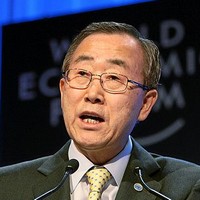For a man who regularly receives disturbing reports from war zones, last week was a particularly bad one for U.N. Secretary-General Ban Ki-moon. As fighting escalated in Gaza and rebel forces launched new offensives in the eastern Democratic Republic of Congo -- where U.N. peacekeepers are on the front line -- Ban also had to manage the fallout from an internal report (.pdf) on the U.N.’s performance during the final phase of the Sri Lankan civil war in 2009. The report tells an appalling story.
U.N. officials in Sri Lanka, the report shows, avoided confronting the government over the fierce assault launched by the Sri Lankan army against Tamil rebels. The offensive killed at least 40,000 civilians and potentially as many as 70,000, according to “credible” sources cited in the report. U.N. higher-ups in New York did no better. “The absence of any form of central coordination and common sense of purpose or responsibility,” one passage states, “made it impossible for the U.N. to formulate a comprehensive vision or plan of action.”
Ban has promised to learn from the report. He could also use it as a prompt to talk more broadly about war and diplomacy, tying the lessons of Sri Lanka to the current crisis in Syria and the deteriorating relations among the big powers -- especially the U.S., Russia and China -- that so often hamstring U.N. diplomacy. Ban’s ability to address these issues will have a decisive impact on the rest of his tenure in New York.

